The South Coast Writers Centre has hosted its most popular festival at Thirroul Community Centre, with well over 1000 tickets sold and up to 150 book lovers present at any given time.
“It's been extraordinarily successful,” said SCWC director Dr Sarah Nicholson on Sunday afternoon.
“We've sold twice as many tickets as we were anticipating and had so much positive feedback, from the audience and from the presenters, on how interesting the programs have been – and the good vibes!”
Festival-goers enjoyed vibrant and thought-provoking sessions, flocking to talks on everything from current affairs to contemporary fiction. There was a strong focus on women’s voices, with headlining authors including Pip Williams (The Dictionary of Lost Words), Isobelle Carmody (Comes the Night), Kate Forsyth (Psykhe), Jessie Tu (The Honeyeater) and Nikki Gemmell (Wing).
Local writers – including Helena Fox, Catherine McKinnon, Lillian Rodrigues-Pang and Dr Jodi Edwards – were also well represented at last weekend's midwinter festival.
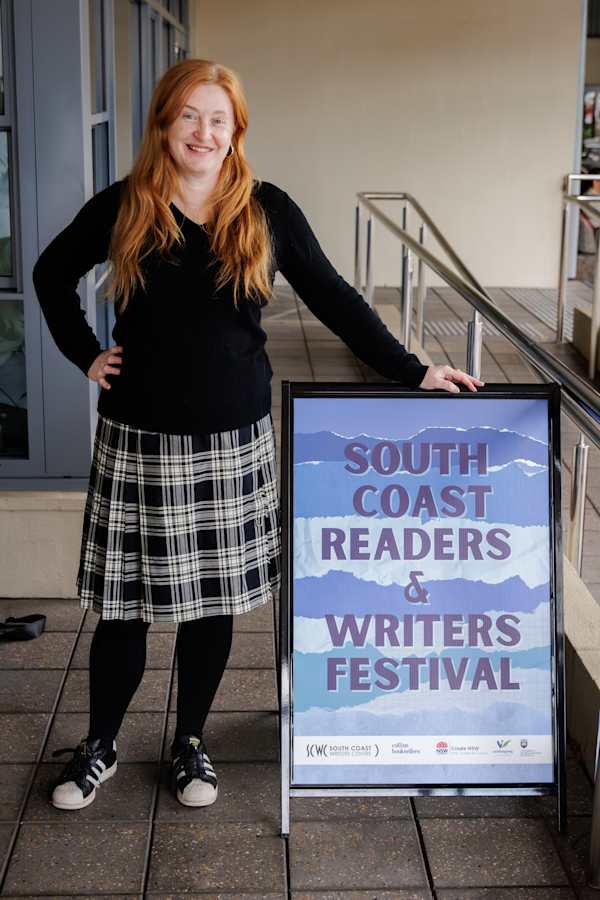
'I want that connection'
Sunday morning’s ‘Authors, Readers & Publishers’ session tackled a pressing issue for creatives everywhere – the evolution of Artificial Intelligence.
Speaking on a panel with Vanessa Radnidge, Hachette’s head of literary publishing; and NSW State Librarian Caroline Butler-Bowdon, local crime writer Hayley Scrivenor criticised the companies using her words to train their AI models.
“I spent nine years of my life writing my two books,” said Hayley, author Dirt Town and Girl Falling.
“This idea that you can farm that work, and you can use my words to train the model, which you acknowledge is valuable and you need to do, but it's not valuable enough you to pay for it, in what other kind of corporate model would we let that happen?”
Hayley compared it to a farmer grazing cows on someone else’s field – paying no rent, even though the grass is essential for the cows’ survival.
“They need to find a way to fairly compensate authors for their words, because they are valuable.”
Ultimately, Hayley has faith in our basic need for human connection.
“I am interested in the authors of works. I am interested in seeing them speak. I come to events like this because I want that connection,” she said.
“I think readers will always care about the one person at the other side of the story that they're reading.”
Judging by the number of people queuing for book signings and the chance to speak directly to authors, local readers won’t be buying books by AI any time soon.
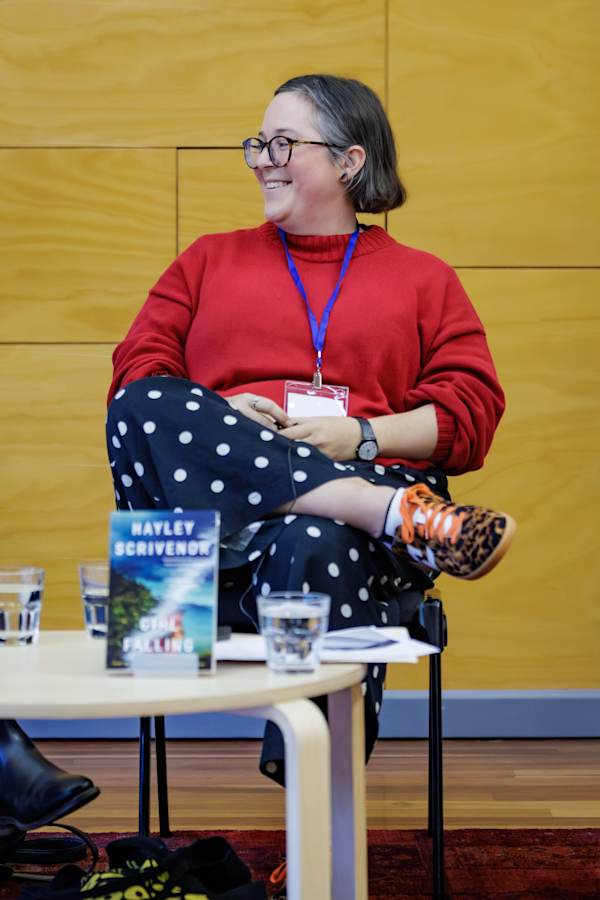
'The new world's going to look like China'
One slogan that brought US President Donald Trump to power was “drill, baby, drill”, but Professor Tim Flannery told Sunday's 10am session that Australians should not be “too worried” about Trump's environmental impact. Instead, the local award-winning author predicts 2025 could be the year the world’s emissions start to decline.
“I wouldn't be too worried about what Trump is doing,” Tim said.
“He's having a big impact on regulation, pollution regulation in the US. That's going to be a big problem for the US.
“In terms of global emissions, there are much bigger moves afoot that are changing the world we live in. At the very forefront of that is China.
“China is deploying more wind and solar than all the rest of the world put together. They've built the factories that can supply the entire world with electric vehicles. They're building the batteries that can supply all the transmission lines.”
An evolutionary biologist, Tim was 2007’s Australian of the Year, head of the Australian Climate Commission from 2011-13 and he has written more than a dozen books, including The Weather Makers. He was speaking on a Current Affairs panel with independent journalist Antony Loewenstein, Walkley award-winner Jan Fran, and Australia Institute political analyst Amy Remeikis, formerly the Guardian's political reporter, who delivered a succint summary of our times.
"Broadly, I think we're seeing end of empire. This is what we're living through," Amy said.
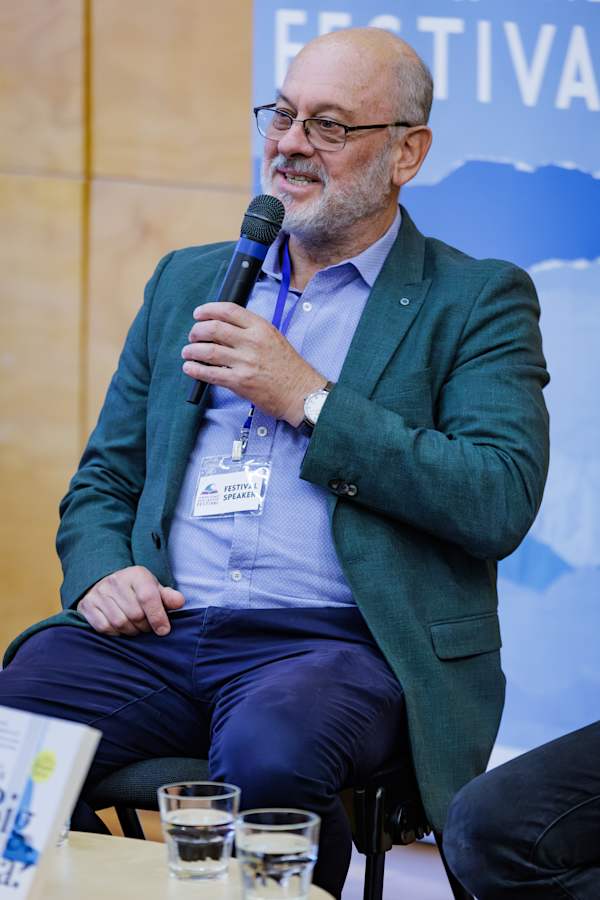
Tim said Australians have been one of the “great beneficiaries” of the fossil fuel era, with some sharing the same yearning as Americans: “To go back to that those days when you'd have a V8 and petrol was cheap and everything seemed great.
“Well, the new world's not going to look like that. The new world's going to look like China.
“My son was just visiting China recently, and he said it's like stepping into the 22nd century. There are fast trains everywhere, electric vehicles on the roads. The cities are quiet. They have made the transition already in large part.
“I think that China will power the global economy in terms of energy, at least, for the foreseeable future …
“In terms of emissions, I'm pretty sure this year will be the year that China starts to decline, and therefore the world’s emissions will start to decline. So that's a really important fact to recognise.”
Prime Minister Anthony Albanese’s Labor government is doing something “really, really important”, Tim said. “We're deploying renewable energy at such a rate now that it's likely, by the time of the next election, somewhere between 60 and 70% of the main grid will be renewable.
“At that point, the debate about whether we have nuclear power is dead.”
Tim is a resident of 2515, the postcode currently taking part in a groundbreaking electrification pilot that was integral in the Illawarra recently being declared NSW’s first Urban Renewable Energy Zone.
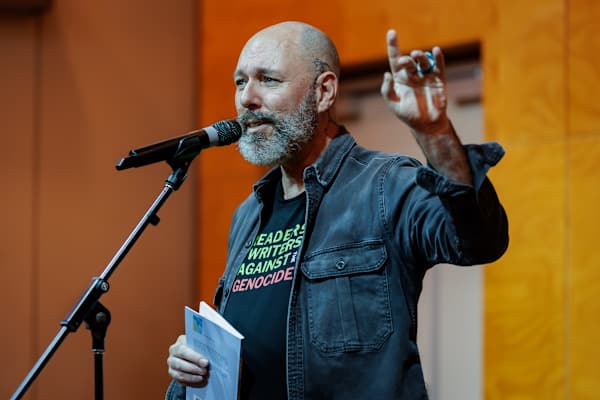
'We're taking a stand in the arts'
Dotted throughout the crowd on Sunday were presenters and guests wearing T-shirts emblazoned with the words 'Readers and Writers Against Genocide'.
The show of support is evidence of a rising tide of humanitarian concern in the creative community over the Gaza war and what Palestine Laboratory author Antony Loewenstein described as “one of the most horrifically violent, complex genocides in the modern era”. In his Sunday talk, the co-editor of Declassified Australia described Australia as "complicit" in Israel's action through continued exports to Israel. "The Labor Government has been 110% behind what Israel is doing economically and practically," he said.
The arts activists who gathered on the steps of Thirroul Community Centre for a group photo included 2024’s Wollongong Citizen of the Year Dr Aunty Barbara Nicholson, SCWC director Dr Sarah Nicholson and the poet Omar Sakr, whose work appears on the back of one of the T-shirts.
“I think there are so many readers and writers who feel so strongly about what is very much a genocide and not a conflict who want to openly and actively support this,” said poet David Stavanger, speaking on behalf of the group of book lovers.
“A lot of us in Illawarra, in this community, are so supportive of Readers and Writers Against Genocide and the work of [founder] Aviva Tuffield to help give us a kind of focal point, and gathering around these T-shirts to visually, publicly declare we're taking a stand in the arts in regards to this.”
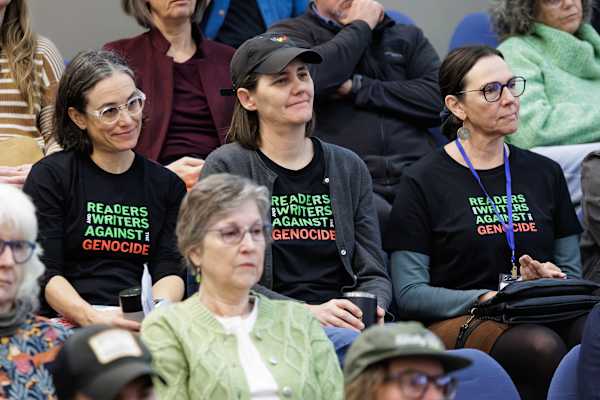
More creativity to come
Inspired by the weekend’s event? Next up at the SCWC is ‘Your Memoir Draft to Done’, a course led by South Coast writers Mike Cavanagh and Anne Howell.
All memoirists welcome. Bookings are essential.

















































































